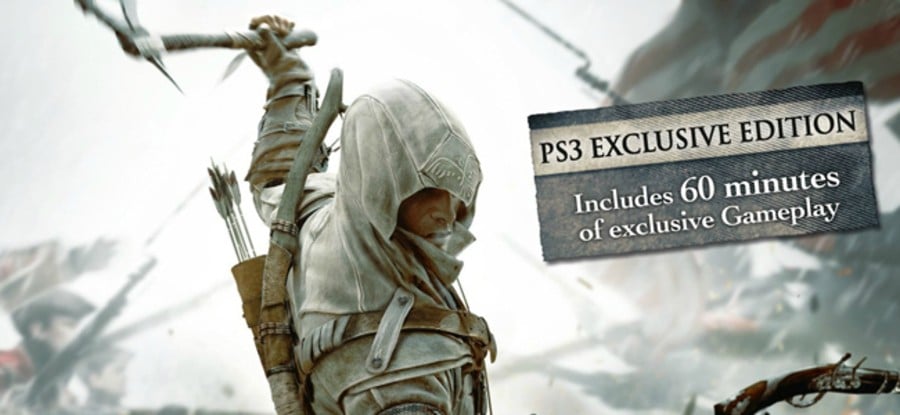
With third-party exclusives slipstreaming the saola on the rotten road to extinction, platform holders are putting a much greater emphasis on exclusive DLC deals. Typically, these arrangements ensure that content remains restricted to a particular system for a set period of time (sometimes indefinitely), with financial incentives and cross-marketing commitments making the pledge particularly compelling for multiformat publishers. But do these contracts ever influence your purchasing habits, or are they merely frustrations that prevent you from obtaining the content that you want?

Sony’s no stranger to these types of deals. Shortly before the release of Batman: Arkham Asylum in 2009, the manufacturer confirmed that the PlayStation 3 version of the game would allow you to play as the Joker, a bonus that was omitted from the Xbox 360 version. This had a profound impact on the game’s sales, with the title performing noticeably better on the Japanese company’s console, despite multiplatform titles generally selling worse on the PS3 at the time. The console later got a couple of additional challenge maps, which remained exclusive to the system in North America only.
And this flags the issue with the shady practice. The abovementioned content actually launched on Microsoft’s system in Europe, meaning that Sony’s investment was purely intended to keep it off another platform overseas. The firm arranged a similar deal for Metal Gear Rising: Revengeance, with its ‘exclusive’ virtual reality missions only launching on the PS3 in North America, but deploying on all systems elsewhere. With the content already built and released for other consoles, both examples essentially entailed the platform holder paying the publisher to stop others from playing it. But is that fair?
Subscribe to Push Square on YouTube167k

Of course, it’s not like Microsoft is exempt from such practices either. Its long term contract with Activision means that PS3 owners are frequently forced to wait a month for every Call of Duty add-on pack. There’s no reason to believe that the content couldn’t launch at the same time on Sony’s console, other than the Xbox maker’s bank balance. The Redmond-based firm has also been fairly prolific at securing deals for titles such as Tomb Raider, Resident Evil 6, and more. It even splashed out on timed exclusivity for The Elder Scrolls V: Skyrim, an expense that was later rendered needless due to the games technical challenges on the PS3.
And this trend is likely to get even more heinous moving into the next generation. Sony has already laid its cards on the table, confirming that the PlayStation versions of Bungie’s upcoming Destiny will ship with exclusive content. Furthermore, both the PS3 and PlayStation 4 editions of Assassin’s Creed IV: Black Flag will come with an additional hour of gameplay. Microsoft, meanwhile, is rumoured to be partnering with EA – and we’d be shocked if it didn’t have several high-profile DLC deals in place ahead of the announcement of its own next generation console in May. But do these strategic alignments actually impact your purchasing decisions?

Aside from the abovementioned Batman: Arkham Asylum example, it’s hard to get a feel for how effective these DLC deals actually are. Call of Duty tends to sell better on the Xbox 360, for example, but is that down to the timed exclusive content, or the strength of Xbox Live and the type of audience that the system attracts? Microsoft would probably argue that its deal with Activision has helped to cultivate that install base on its platform, but we’re not convinced. Does anyone really buy into a console knowing that they can purchase a map pack a few weeks earlier than on an alternative system?
We suppose, if nothing else, the deals augment each manufacturer with an opportunity to boast – and with the lines between the various consoles being blurred, that may be considered a worthwhile investment. But with the net results merely agitating other consumers, we wished that Sony would point its cheque book elsewhere. Exclusive content should help to define the ethos of a system, not be the product of slimy schmoozing sessions with third-party publishers. Sadly, we can’t help but feel that this practice is only going to get more and more prevalent as time goes on.
Has a DLC deal ever influenced your purchasing decision? Have you ever found yourself drawn towards the specific version of a game due to its inclusion of exclusive bonus content? Let us know in the comments section and poll below.
Do DLC deals influence your purchasing habits? (21 votes)
- Yes, I buy whichever version of a game has exclusive or timed exclusive DLC
- Sometimes, but it depends on what the content is
- Never, I buy games for my favourite system – irrespective of added incentives
Please login to vote in this poll.





Comments 17
nope.
I would be affected yes, but not to the point of buying it for another console.
I want to say no, but I'd be lying since I'm waiting for a "Complete" version of Injustice before picking it up.
I've bought Oblivion vanilla PC, vanilla ps3, GOTY ps3, 5th anniversary edition; Fallout 3 vanilla ps3, GOTY ps3; Fallout NV vanilla, GOTY; Skyrim ps3 vanilla, and would buy GOTY if the DLC weren't half off that one time. So, yes, the content of a game is what you are buying.
It means absolutely nothing to me. Can honestly say the only Xbox exclusive anything I'd want on the PS3 is Left 4 Dead.
As for COD, the only reason it sells better is because of the amount of 13 year old American rednecks who just want to be racist arseholes online. Which is about half of the Xbox's target market.
I bought Borderlands 2 on launch day because I got the one thing for free, and also got Paige for free, but as for getting it on a different console for some special dlc, I never do that, I only have a PS3 so that's my console of choice.
Removed - inappropriate
@hydeks Great game. Currently playing through the Hammerlock DLC. Jackenstein is such a tosser.
@TheRealBatman It's pathetic really isn't it? Amazing that these kids aren't taught that winning isn't everything. Then again, American's are brought up being told "YOU ARE THE BEST! WOOOOO!"
It will influence my purchases from time to time. I bought GTA IV on 360 because at the time it looked like the extra episodes would be exclusive. I got the PS3 version of Arkham Asylum because of the Joker DLC and the Benedict Arnold missions in Assassin's Creed 3 made me switch over after having previously purchased the AC games on Xbox. Though it wasn't DLC, Kratos being in the PS3 version of MK was a factor in my decision on which console to buy it for.
@TheRealBatman
You can always mute people, that's what I do. Doesn't matter which console either, there are a lot of a-holes on XBL but there is an equal number on PSN.
Yeah, must admit, I groaned when they announced headsets would be included with the PS4. I think that's part of the problem. I've never been big on talking in games, so always preferred that the PS3 was a "quieter" environment.
@Gamer83 I muted people pretty much everyday, but when they realized I had them muted, my inbox was flooded with all kinds of things 12 year olds shouldn't say. The funny thing about it, is that I rarely ever run into rude people when I play online with my PS3.
@rastamadeus Charlie Sheen said something that I really agree with at one point; "All their lives we teach our kids how to win, but we never teach them how to lose", that's not how he said it, but you get the point. Most parents teach their kids that losing is never an option and then act surprised when their child overreacts to a loss.
@TheRealBatman Who'd have thought Charlie could ever make such an astute observation?
DLC may sway which version of a game I get, as long as it is extended game-play, extra missions etc. Not swayed by weapons, outfits, artwork etc. Don't have multiple consoles so that is not a consideration personally.
Yes and no. I'm far more likely to pre-order a game I think i'll buy if I know I'll get some pre-order content.
I would NOT buy another version of a game (PC/Xbox) if it had exclusive DCL or timed DLC. I buy third party games on the PS3 because that's where I've invested my library and time.
If the choice is between Vita and PS3, then DLC can effect my choice, but Sony System vs PC or Xbox - no
Ps3 has better exclusive things. Because 360s exclusive things are just getting the dlc first then other systems but ps3 still get then but ps3s exclusive stuff is only on ps3
Show Comments
Leave A Comment
Hold on there, you need to login to post a comment...